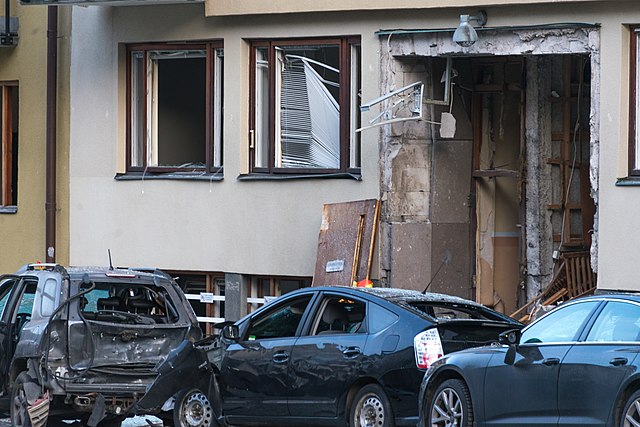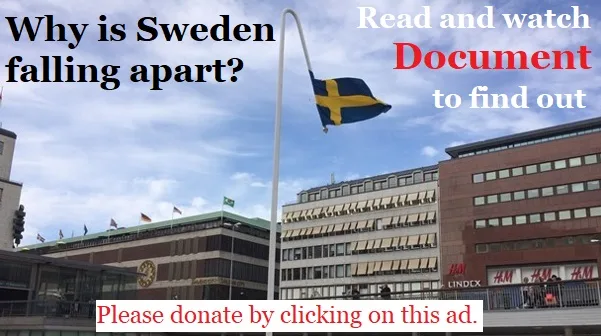«The point of no return (PNR or PONR) is the point beyond which one must continue on one’s current course of action because turning back is no longer possible, being too dangerous, physically difficult, or prohibitively expensive to be undertaken. The point of no return can be a calculated point during a continuous action (such as in aviation). A particular irreversible action (such as setting off an explosion or signing a contract) can be a point of no return.»
English Wikipedia
PONR, the point of no return, has passed. Sweden is lost. The monopoly on violence has been taken over by criminals. Politicians have long refused to realise what awaited them down the road, and now they refuse to take responsibility for the consequences of their own negligence. Instead, it is – as usual – the general public that is being urged to «take action» against the violence.
«Everyone should help each other …»
Now, more police, drone surveillance and search zones are not enough. Blasting and shooting is still happening. That’s why the Stockholm police now believe that «society must come together”. It’s the same theme that has been repeated over and over again in recent years. We remember how the then National Police Commissioner Anders Thornberg believed that «the whole of society must contribute to stopping gang violence», how Police Commissioner Carin Götblad said that «everyone should help each other» to stop criminal gangs, or how the Social Democrats wanted to put the responsibility for stopping recruitment to criminal gangs on the country’s teachers.
These people are paid by taxpayers to fulfil their mission: to protect the people. But when their incompetence and inability is revealed, they choose to delegate the task to the people. How is that usually expressed? «Resign your positions. All of you!»
Sweden – a gang-criminal Mecca
The formerly safe and boring Sweden has undoubtedly transformed into a gang-crime Mecca (no pun intended) and the situation is, diplomatically speaking, extreme. But who should be in charge of combating violence? Clue: It’s not the general public.
And the truth hurts: If the nation’s police, justice system and lawmakers can’t stop the bombs, killings and attacks, national collapse is a fact.
After decades without border controls (or any controls at all) and a justice system in which everyone charged with dealing with the rampant violence – from patrolling police to lawyers and correctional officers to the courts – are primarily social workers and counsellors, Sweden is now reaping the consequences:
More than one bomb per day
During the first month of the year, 33 explosive charges were detonated in Sweden. So far. Or just «blasts», as the new parlance has it. After all, it sounds better than «bombs». In the same way that «shooting» sounds better than «murder» or «attempted murder», and «misfiring» sounds better than «just so you know: there are idiots running around our streets unable to identify the person they are hired to murder, and you (or someone you love) could be the next victim if you have the misfortune to look like someone other than yourself.»
We can all be the next victim, if we happen to «find ourselves in the wrong place at the wrong time». Like being on your way to school, or sitting on the bus, or cycling from the swimming pool with your son, or sleeping in your bed. Or coming out of the toilet, like Per Lundholm, who is now in hospital after a bomb exploded outside his front door last week.
The tradition of blood feuds has also taken hold in Sweden. Being a relative of a gang criminal is a life-threatening experience, as Rawa Majid’s uncle, better known as «The Kurdish Fox», experienced when he was shot dead in a shop in Husby on Wednesday.
Low-intensity war
There is no doubt that Swedes – previously described as «peace-injured» – are characterised by living in what can best be described as a low-intensity war. Everyone who comes to Sweden from other countries with stories of blown-up homes, gunshots outside the door and raped children is granted asylum. But where should we Swedes flee to, now that our country has turned into a cold-climate Middle East?
The trend can no longer be reversed. It has gone too far, and the painful realisation has begun to sink in among the majority of the population: None of those responsible for bringing Sweden to this desolate state want or can deal with the consequences of their many flawed decisions: We have reached the point of no return.
Those who had the financial ability to do so have already sought refuge abroad. And many of those who realise they can’t escape are sinking into apathy. They are somehow content to eat tacos on Fridays and watch Idol. The brain is merciful that way, and normalisation – encouraged by the media, which continues to hammer home the message that «it’s always been this way, or worse» – overshadows the desperation.
Basically, however, it is now impossible to hold a conversation with someone for more than five minutes without mentioning 1) that the state of the Swedish «people’s home” is extremely deplorable, 2) that you feel powerless in the face of the negative developments in a society where you, as a taxpayer, 3) are regarded solely as a source of funding for a corrupt «everything-for-everyone» system, and start 4) advising each other on how to escape the misery by emigrating or 5) how to maintain physical and mental health if forced to stay.
But Minister of Justice Gunnar Strömmer (M) confirms that he feels safe, despite the fact that an explosive device exploded a hundred metres from his own home a few weeks ago. What more can he say? But he still supports the government’s proposal to lower the age of criminal responsibility from 15 to 14, in order to, at best, get hold of a few more of the child soldiers who today patrol our streets looking for someone to eliminate for a few hundred dollars, a pair of nice Nike sneakers or a higher status.
It’s over. Or…
Strömmer, like the rest of the government and the Riksdag, however, probably realises the same thing as the Swedish people: It’s over. With children de facto running around murdering and blowing people up on a daily basis, the nation has passed a point where it is «no longer possible to reverse the trend; it is too dangerous, too physically difficult or prohibitively expensive to carry out the necessary turnaround.»
Those in power, responsible for protecting Sweden and Swedish citizens, are not going to do what is required, and the general public should preferably not have to do what is required. But maybe we must?
If we really want to see a change, perhaps it is possible, after all, provided we are prepared to do what is usually considered «too dangerous, too physically difficult or prohibitively expensive». But in that case, it’s not «help» that’s needed – it’s an ideological revolution. It’s dangerous, difficult and (in many ways) costly. But not impossible. It’s been done before in the history of the world, and it can be done again.
The message to both those in power and perpetrators of violence would then be very simple and impossible to misunderstand: «You took our country from us. Now we’re taking it back. No matter the cost.»
When you read the list below, remember that Sweden is a small country with a population of about 11 million people.
Bomb explosions in January:
4 January, 20:05. Kortedala, Gothenburg
4 January at 21:06. Täby city centre, Täby
4 January at 21:21. Kålltorp city centre, Gothenburg
7 January at 00:29. Valdemarsro, Malmö
10 January 03:25 Hammarbyhöjden, Stockholm
11 January at 03:03. Bredäng, Stockholm
11 January at 13:13. Hagsätra, Stockholm
12 January at 06.01. Eklanda, Mölndal
13 January at 21:47. Segersjö, Tumba
14 January at 21:46. Stone Hill, Nyköping
15 January at 01:00. Märsta, Sigtuna
15 January at 22:12 Alby, Botkyrka
15 January at 23:35. Johanneberg, Gothenburg
18 January at 00:22 Hökåsen, Västerås
18 January at 03:36. Segeltorp, Huddinge
18 January at 04:22. Johanneshov, Stockholm
20 January at 19:30. Skarholmen, Stockholm
20 January at 23:30. Västra Frölunda, Gothenburg
21 January at 03:00. Åsted, Eskilstuna
22 January at 03:00. Norsborg, Stockholm
23 January at 00:03. Kungsängen, Uppsala
23 January at 00:15. Brandbergen, Haninge
23 January at 22:03. Farsta, Stockholm
24 January at 00:32. Söderkulla, Malmö
24 January at 01:00. Stenby, Eskilstuna
26 January at 03:42. Enskededalen, Stockholm
26 January at 19:16. Toll station, Nacka
27 January
27 January at 02:11. Bridge, Upplands-Bro
28 January at 02:55. Ödåkra, Helsingborg
28 January at 04:05. Karrtorp, Stockholm
28 January at 08:46. Bagarmossen, Stockholm
28 January at 16:46. Årstaberg, Stockholm
28 January at 23:36. Bro, Upplands-Bro
Source: Polisen.se
Footnote: At the time of writing, I am receiving news that Salwan Momika has been murdered in Södertälje. The media refers to him categorically as «the Quran burner”, and yet another message about who owns the monopoly on violence has been sent to the Swedish people.


